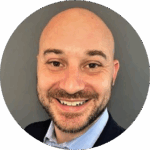 Henry Young – Senior Director, Policy
Henry Young – Senior Director, Policy
I was born and raised in Chicago and recently moved from Washington, DC, to Vienna, VA.
After graduating from Tulane University in New Orleans, I worked on several political campaigns and at the Brookings Institution before attending law school at the University of Illinois. After law school, I held various positions at the United States Department of Commerce, including senior counsel and senior policy advisor in the Office of the Secretary of Commerce, as well as associate director for strategic planning in the National Institute of Standards and Technology’s Communication Laboratory. I joined BSA in April 2021.
What/who inspired you to pursue the career you have today?
President Bartlet’s Chief of Staff, Leo McGarry. But seriously, I was probably drawn to “The West Wing” because I liked politics and policy more than the other way around. I have always been interested in government, policy, and the law. Today, all of these areas interact with technology to change the world we live in, and I can’t imagine a more fascinating intersection.
What’s the most helpful thing you’ve learned working at BSA?
There are an infinite number of ways to be excellent. My colleagues all have different approaches to their jobs, and yet each of them is excellent. Similarly, BSA members are finding new and interesting ways to excel. There is no single way to be great.
What’s one piece of career advice you are still trying to master?
Your greatest strength is your greatest weakness. There is always a tension between leveraging one’s most effective or admirable qualities, but when overused, that strategy can highlight one’s biggest faults. Finding the right balance of playing to one’s strengths and improving one’s weaknesses takes vigilance.
Tell us one fun fact about you (that might surprise your colleagues).
During college, I studied abroad in Cuba. I chose Cuba because I thought it would be interesting to go to a country that was so different from the US and that most Americans have not — and would never — visit. I was struck by the absence of advertising and chain stores. It wasn’t that I didn’t know there weren’t McDonald’s in Cuba, but that living in a place where chains and ads were not ubiquitous was noticeable and strange.
I also noticed that while most Cubans were far less wealthy than Americans and did not have the choices we had — a trip to the grocery store to check out the cereal aisle is a useful reminder of how good we have it — people in Cuba were very well educated and not concerned about violent crime.
The trip made me grateful that I was born in the US and also increased my awareness that poverty does not look the same in all countries.
What’s the most meaningful piece of advice you’ve ever been given?
“It’s amazing what you can accomplish if you do not care who gets the credit.” Technically, President Truman did not give me that advice directly, but I try to keep it at the front of my mind.
What is your favorite food?
Barbecue. Like jazz and superheroes, it’s a great American art form with numerous regional styles that provide variations on a theme. I could eat barbecue every day and never get sick of it. And let’s not forget the sides: corn bread, fries, collard greens, mac and cheese. I just ate, but now my mouth is watering, and I’m hungry again.
Favorite book/podcast/long-form article you recommend? What did you learn?
I think it is impossible to recommend a book without knowing the person who is asking for the recommendation — a good recommendation is the right book, for the right person, at the right time. However, if someone wants to understand people generally, I’d recommend “Thinking, Fast and Slow,” by Daniel Kahneman.
How do you unwind after work?
I don’t feel like I have to unwind after work! Having had stressful jobs in the past where it was nearly impossible to unwind, I appreciate that I find my work at BSA challenging, meaningful, rewarding, and enjoyable. (But I do recommend that everyone deletes social media apps from their phones if practicable, because the stress and anxiety they create typically outweigh any benefits they provide.)

